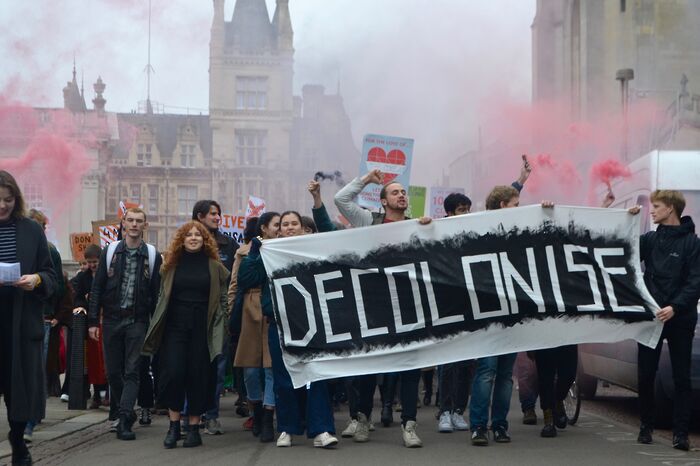Cambridge lags behind on original carbon emission reduction targets
The CUSU Ethical Affairs campaign has criticised Cambridge for having lowered their original carbon targets in 2017, while a University spokesperson called them “arbitrary and unrealistic”

The University of Cambridge is on track to miss by a wide margin its original ten-year environmental sustainability target set in 2010, of a 34% reduction in its carbon emissions by 2020/21 against a baseline year of 2005/06.
Ahead of a meeting of the University’s Environmental Sustainability Strategy Committee (ESSC) set to take place later this month, the CUSU Ethical Affairs Campaign has criticised the significant curbing of the University’s carbon emissions reduction goals last year, and has called for Cambridge to set a goal of carbon neutrality by 2030 – the University is currently committed to carbon neutrality by 2050.
In the University’s 2017 Environmental Sustainability Report, it found that emissions had in fact increased by 3% since 2005, and the ESSC’s original target of a 34% reduction by 2020/21 was subsequently lowered to 6%.
A spokesperson for the University said, “experts have been working [on] how we can bring the University’s target date for carbon neutrality forward by a decade in recognition of these issues”, to be presented in a report to Council later this year.
They described the original targets set in 2010 as “arbitrary and unrealistic”, and that they are planning a move to science-based targets, which are institutional targets recommended by an initiative led in part by the UN Global Compact.
The report calculated that the University’s total carbon emissions from energy and fuel use reached 74,489 tonnes in 2016/17, down from 80,788 in 2014/15 and 77,586 in 2015/2016.
The carbon emissions targets themselves have also been criticised by CUSU Ethical Affairs Officers Jake Simms and Alice Gilderdale as “inadequate and misleading”, as they exclude the carbon emissions of individual colleges and other organisations associated with the University, such as Cambridge University Press.
The targets also only take into account ‘Scope 1’ and ‘Scope 2’ emissions – direct emissions and those produced by purchased electricity – and do not include indirect ‘Scope 3’ emissions, such as investments and staff travel.The ESSC’s 2017 report found that Scope 3 emissions accounted for 28% of the university’s total energy use in 2016/17, and had increased by 37% compared to the previous year, though the University has noted Scope 3 emissions are difficult to accurately measure, due to “a lack of robust data”.
The University’s 2017 report also noted that the University’s water consumption has increased 10.8% from 2005/06 and is expected to just exceed 2005 levels by 2020/21. It also noted that the University “can do better” on its waste management, as high levels of construction waste caused its waste levels per full-time staff or student to increase from 0.28 tonnes to 0.68 tonnes.
In the longer term, although the University is currently committed to reaching carbon neutrality by 2050, its executive decision-making body, University Council, accepted recommendations to change this goal to carbon neutrality by 2040. The Council also agreed last June to establish a Centre for a Carbon Neutral Future, to bring together strands of research on sustainability taking place across the University, which a spokesperson described as “promot[ing] a global move to a carbon-neutral future”.
A petition launched by the Ethical Affairs campaign has called for Cambridge to bring its goal for carbon neutrality forward to 2030, and has received over 240 signatures.
CUSU President Evie Aspinall criticised Cambridge’s target as “weak” in having too narrow a scope and lacking coordination across the collegiate University, arguing the current goals “amount to a failure of leadership on the most pressing ethical issue of our time”.
Simms and Gilderdale further demanded that “[t]he University must commit to immediate radical action” on both its carbon emissions and in divesting its endowment from the fossil fuels sector.
University Councillor Marcel Llavero Pasquina further argued, “Cambridge is part of the social elite that has contributed most to the problem, [and] it is now our duty to show respect and pay our debts to the people most impacted by climate injustice”, calling for the University to cut emissions to zero before 2030 and divest from fossil fuels “within the next 5 years”.
 Arts / Plays and playing truant: Stephen Fry’s Cambridge25 April 2025
Arts / Plays and playing truant: Stephen Fry’s Cambridge25 April 2025 News / Candidates clash over Chancellorship25 April 2025
News / Candidates clash over Chancellorship25 April 2025 Music / The pipes are calling: the life of a Cambridge Organ Scholar25 April 2025
Music / The pipes are calling: the life of a Cambridge Organ Scholar25 April 2025 Comment / Cambridge builds up the housing crisis25 April 2025
Comment / Cambridge builds up the housing crisis25 April 2025 Comment / Pick an exam format and stick to it25 April 2025
Comment / Pick an exam format and stick to it25 April 2025






